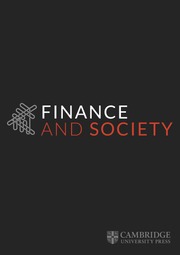No CrossRef data available.
Article contents
The paradox of economism
Published online by Cambridge University Press: 09 November 2023
Extract
For some decades now, progressively minded social scientists have argued that markets are too important to leave to economists — indeed, entire new subfields have formed in response to this concern. But this engagement with economic life has often been somewhat half-hearted. Particularly telling in this respect is the fact that these new fields have organized themselves centrally around the rejection of ‘economism’ — the idea that markets have self-regulatory properties. Scholars in fields such as political economy and economic sociology have devoted a great deal of energy to normative critiques of the market, but they have displayed much less interest in rethinking the core categories and principles of economic life itself. What the books considered here have in common, and what sets them apart from established ways of thinking, is a willingness to tarry with the paradoxes of money.
- Type
- Forum: Money’s other worlds
- Information
- Creative Commons
- This is an Open Access article, distributed under the terms of the Creative Commons Attribution-NonCommercial-No Derivatives licence (http://creativecommons.org/licenses/by-nc-nd/4.0/), which permits noncommercial re-use, distribution, and reproduction in any medium, provided the original work is unaltered and is properly cited. The written permission of Cambridge University Press must be obtained for commercial re-use or in order to create a derivative work.
- Copyright
- © 2015 The Author(s)


